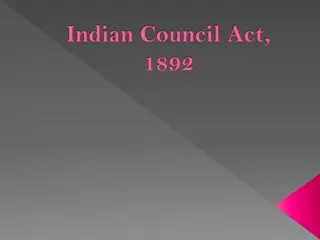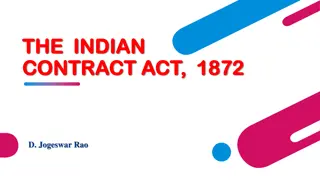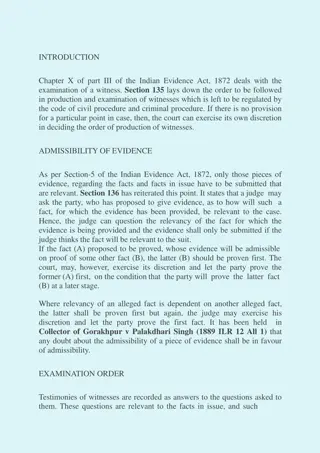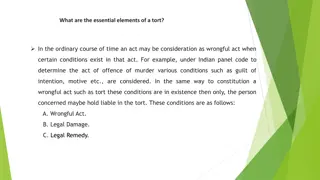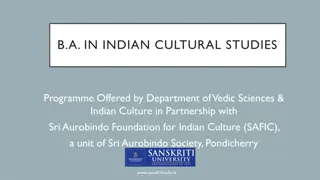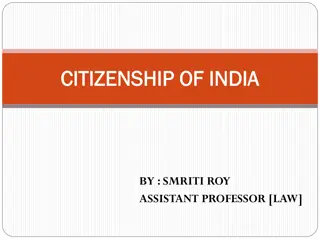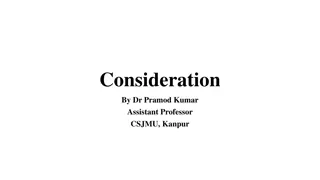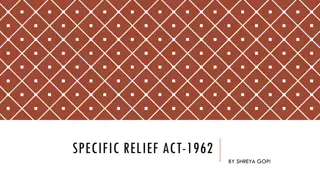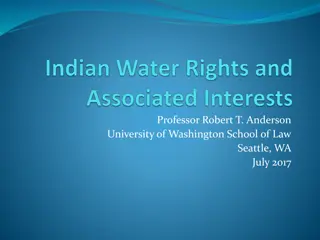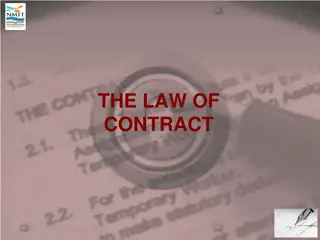Overview of Indian Contract Act 1872 and Essential Contract Law Principles
This detailed content provides insights into the Indian Contract Act 1872, essential principles of contract law including valid contracts, classification of contracts, essentials of a valid offer, and legal rules of acceptance. It covers topics such as enforceability, legal obligations, valid contract essentials, types of contracts, and rules of offer and acceptance with relevant legal cases.
Download Presentation

Please find below an Image/Link to download the presentation.
The content on the website is provided AS IS for your information and personal use only. It may not be sold, licensed, or shared on other websites without obtaining consent from the author.If you encounter any issues during the download, it is possible that the publisher has removed the file from their server.
You are allowed to download the files provided on this website for personal or commercial use, subject to the condition that they are used lawfully. All files are the property of their respective owners.
The content on the website is provided AS IS for your information and personal use only. It may not be sold, licensed, or shared on other websites without obtaining consent from the author.
E N D
Presentation Transcript
Indian Contract Act 1872 Samiuddin, Contract Law- I
Contract An agreement enforceable by law is a contract. S. 2(h) Agreement + enforceability by law =contract Agreement must create a legal obligation or duty. Agreement: Sec. 2(e), Every promise and every set of promises, forming consideration for each other. Social agreements Legal agreements Legal agreements are contracts. Legal Obligation: AKA Intention to create contract Balfour v Balfour Mcgregor v. Mcgregor Samiuddin, Contract Law- I
Essential of valid contract Offer and acceptance Intention to create legal relationship Capacity of parties Competency (S. 11) Lawful consideration (S. 23) Lawful object (S. 23) Free consent (S. 14) Agreement not expressly barred by law (S. 24) Not declared by law to be void (Ss. 24-30, 36, 56) Legal formalities Samiuddin, Contract Law- I
Classification of Contract According to validity: Valid contract, voidable contract, void contract, IL-legal contract, unenforceable contract. According to formation: Express contract, Implied contract, Quasi contract. According to performance: Executed contract, Executory contract, Unilateral and bilateral contracts. Samiuddin, Contract Law- I
Essentials of a Valid Offer An offer may be general or specific (Weeks v Tybald, Carlill v Carbolic Smoke Ball Co) An offer should be made with an intention of creating legal obligation (Balfour v Balfour) An offer must be definite and certain A statement of intention and an invitation to offer are not offers. (Harvey v Facie, McPherson v Apanna, Bank of India v O. P. Swarnkar) An offer must be communicated to the offeree. (Lalman v. Gauri Datta, Harbhajan v Haricharan) Samiuddin, Contract Law- I
Two identical offers do not make a contract. They are cross- offer. (Hyde v Wrench, Nihal Chand v Amarnath) An offer should not contain any term the non-compliance of which amounts to acceptance. Offer cannot prescribe silence as a mode of acceptance. (Felthouse v Bindley) Offer must be an expression of willingness to do or abstain from doing anything Offer must be made to obtain assent of the other. Samiuddin, Contract Law- I
Legal Rules of Acceptance When one person to whom the proposal is made signifies his willingness thereto the proposal is said to be accepted. [S 2(b)] Rules: An offer can be accepted only by the person to whom it is made. (Boulton v Jones) Acceptance should be unconditional and absolute.[S. 7(1)] (Hyde v Wrench) Acceptance should be communicated (Felthouse v Bindley, Powel v Lee) Acceptance should be according to the prescribe form or in reasonable manner. [S. 7(2)] Silence cannot be prescribed as mode of acceptance. Acceptance must be given within the time stipulated or within a reasonable time. Acceptance must be given before the offer lapses or is revoked. (Ramsgate Victoria Hotel Co. v. Montefoire) Provisional acceptance is no acceptance. Samiuddin, Contract Law- I
Lapse of Offer [S. 6] 1. By notice of revocation ( S. 4, 5) 2. By lapse of time prescribed in proposal 3. By failure to accept condition precedent 4. By death or insanity of offeror. Samiuddin, Contract Law- I
Communication when Complete? English Law: Household Fire & Accident Insurance Co. v Grant Indian Law: Section 4 Entores Ltd v. Miles Far East Corporation Bhagwandas v Girdharilal Revocation of Proposal and Acceptance Section 5 Ram Das Chakravorty v. Cotton and Century Ginning Mills Samiuddin, Contract Law- I










